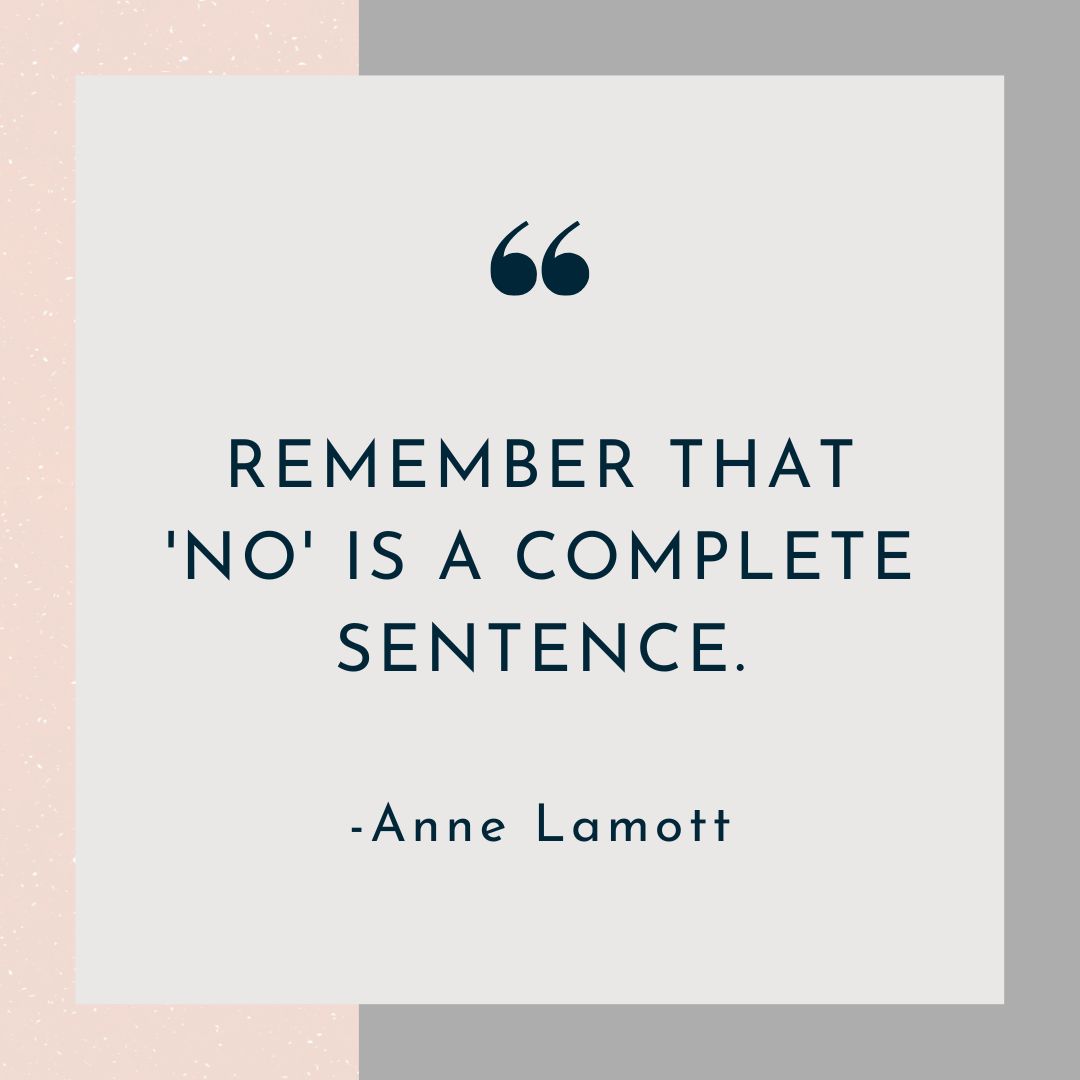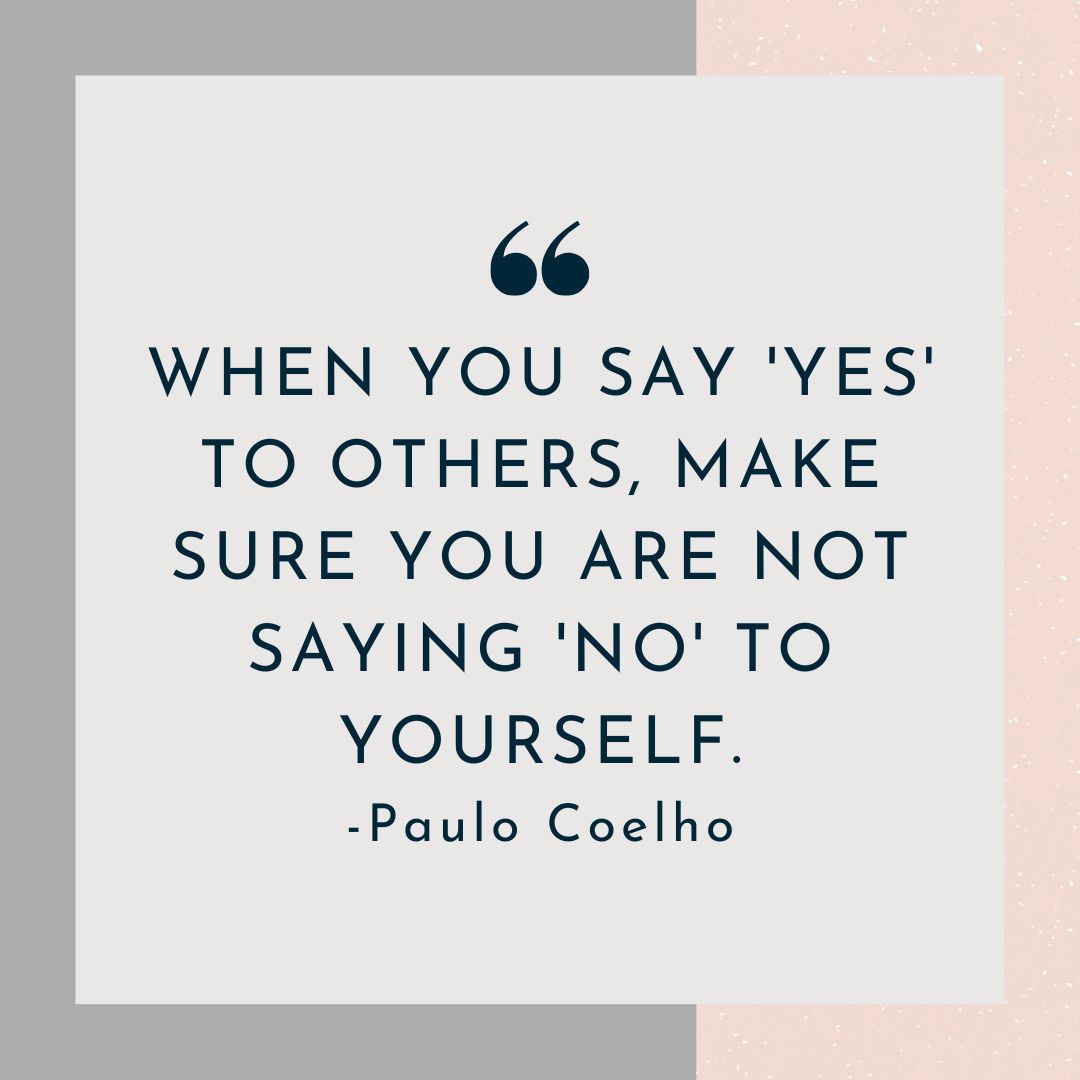HOW TO MAKE SURE YOU’RE NOT COMING LAST
Do you have a hard time saying “no”? If you take on too many tasks, leaving little time for yourself, you’re not alone. Many of us struggle with setting boundaries and prioritizing our own needs.
Being eager to help those you value isn’t all bad. But studies have shown that people who can effectively say no report higher levels of life satisfaction, self-esteem, and well-being.
If you’ve been saying “yes” for a long time, it can be tough to retrain yourself to give any other answer. Practice these strategies to buy yourself time and strengthen your “no” muscles.
- Evaluate your priorities: Before saying “yes” to any request, take a moment to evaluate your priorities. Ask yourself if this new commitment aligns with your goals and values, and whether it’s something you truly want to do.
- Practice the “thank you, but” approach: Instead of saying a flat-out “no”, try using the “thank you, but” approach. For example, “Thank you for thinking of me, but I won’t be able to commit to that at this time.” This shows gratitude for the request while still setting a clear boundary.
- Practice saying “no” in front of a mirror. It’s silly, but sometimes, the most challenging part of saying “no” is simply getting the words out.
- Buy yourself time to think. Instead of saying, “I can do that,” try saying, “I may be able to do that. Let me get back to you in an hour.” Then take time to look at your calendar and evaluate whether the task is something you can (or should) accommodate.
- Set boundaries in advance: If you know you have trouble saying “no,” set boundaries in advance. For example, let friends or family know you have standing days or times when you can’t make plans.
- Journal about your motivations. The last three or four times you agreed to take on a task, why did you do it? Were you hoping to impress someone? Did guilt or insecurity about the relationship fuel you? What was the outcome? Understanding why you’ve overcommitted and how it left you feeling can be helpful insight the next time you’re tempted to raise your hand.


Now that you’re taking action to stop your calendar from over-filling, it’s time to be intentional with the time you’ve safeguarded. Self-care simply means prioritizing your own physical, emotional, and mental well-being. It’s important to make self-care a regular part of your routine and schedule time for it on your calendar. Here are some small changes you can make to introduce more self-care into your day, week, and year:
1. Start your day with quiet time
Instead of checking your phone first thing in the morning, take a few minutes to sit quietly and focus on your breath. If meditation isn’t your cup of tea, enjoy quiet reading or stretching during those minutes. Whatever you do, make it a ritual that brings you calm and focus.
2. Take a short walk or stretch break during the workday
If you spend much time sitting at a desk, schedule a short break every hour or two to stretch your legs or take a quick walk outside. Stepping away can help reduce stress and increase your productivity.
3. Schedule a regular time for a hobby or activity you enjoy
It could be reading, painting, playing music, running, or practicing a sport—whatever helps you relax and recharge. Put it on your calendar as a recurring event so you’re reminded each time you review the week ahead.
4. Unplug from technology
Set aside some time each day to disconnect from technology, whether it’s turning off your phone an hour before bed or taking a break from social media on the weekends. Disconnecting can help you relax and be more present in your personal time.
5. Reward Yourself
Not all self-care is enjoyable. Scheduling your annual checkup, going to that dental cleaning, and taking your daily vitamin may not be thrilling, but they are important. Try rewarding yourself for checking off less pleasant tasks. Book a massage right after that mammogram. Treat yourself to a pedicure for taking your vitamin every day that month. Rewarding self-care with more self-care is effective because the treats feel like something you’ve earned instead of indulgences.
8 Self-Care Options That Cost Nothing
Go for a hike: Spending time in nature can help reduce stress and improve overall well-being. Look for nearby trails or even parks and take a short hike to enjoy the outdoors.
Declutter your space: Spend some time decluttering a room or space in your home. Clearing out physical clutter can help create a sense of calm and order.
Practice gratitude: Take a few minutes to write down things you’re grateful for in a journal or on a piece of paper. Focusing on the positive things in your life can help shift your mindset and reduce stress.
Do a digital detox: Turn off your phone, computer, and other digital devices for a set period of time. Don’t turn them on again until you’ve decided how you want to configure your settings for more distraction-free time.
Take a bubble bath: Fill up your tub with warm water and add some bubbles or essential oils. Bring a big glass of ice water and turn on a spa or yoga playlist to set the mood.
Have a dance party: Put on some music and dance around your living room. Moving your body and listening to music can help boost your mood and reduce stress.
Practice deep breathing: Take a few deep breaths, focusing on inhaling and exhaling slowly and deeply. This can help reduce stress and increase relaxation.
Read a book: Set aside some time to read a good book. Reading can help you escape from the stresses of daily life and relax.


